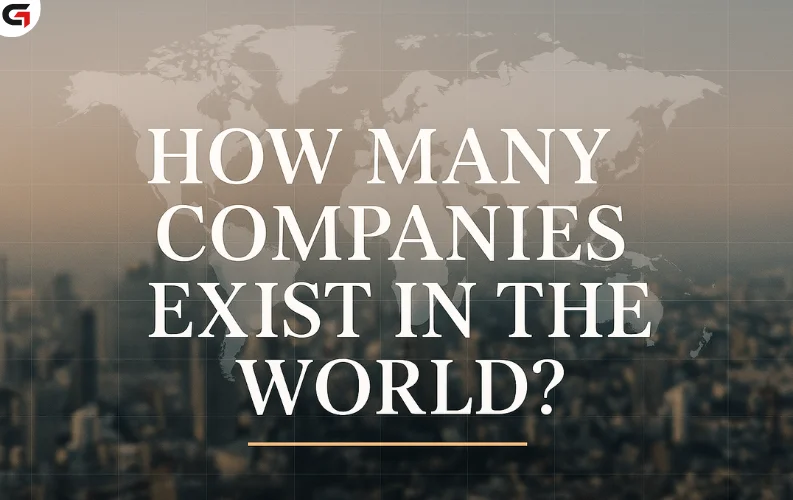In today's hyper-connected global economy, companies of all shapes and sizes power the engines of innovation, employment, and economic development. From microenterprises operating out of rural villages to multinational corporations with billions in revenue, businesses are the lifeblood of every country.
A natural curiosity arises: How many companies exist in the world? It's a seemingly simple question, yet the answer is far from straightforward. Estimating the total number of companies globally requires a nuanced understanding of how businesses are registered, tracked, and categorized, especially when factoring in informal and unregistered enterprises that often fly under the radar.
In this comprehensive article, we dive deep into global business statistics, explore country-specific data, and explain why this number continues to grow rapidly. By the end, you'll gain valuable insight into the true scale of entrepreneurship and business activity around the world.
Also Read:- Top 10 Wellness Strategies for Busy Business Professionals
Defining a “Company” in Global Context
Before estimating the total number of companies in the world, it’s essential to define what we mean by a “company.” Globally, the term can refer to a variety of business forms:
-
Formal registered businesses: Legally recognized entities registered with a government body.
-
Informal businesses: Unregistered operations, often in the informal economy, that generate income but aren't subject to taxes or formal regulation.
-
Sole proprietorships and freelancers: Single-person operations that may or may not be officially registered.
-
Micro, small, medium, and large enterprises (MSMEs and MNCs): Defined differently by each country, usually based on employee count or annual revenue.
Since many businesses around the world are informal or unregistered, any global estimate must account for both formal and informal sectors.
Global Business Estimates: The Big Picture
As of 2024, the total number of businesses operating globally is estimated to be between 300 million and 430 million. This includes:
-
Approximately 150 to 170 million formally registered companies with government databases or corporate registries.
-
An estimated 150 to 260 million informal enterprises, largely in developing nations and emerging markets.
These figures are compiled and projected based on data from global organizations such as:
-
The World Bank
-
The International Labour Organization (ILO)
-
The Organisation for Economic Co-operation and Development (OECD)
-
Country-level government statistics and business registries
The sheer number demonstrates the immense scale and diversity of the global business landscape.
Formal Companies by Region and Country
Let’s look at some of the world’s major economies and how many businesses they report.
1. United States
The U.S. is one of the largest economies globally and has a robust system for tracking business data.
-
As of 2023, there are approximately 33.2 million businesses registered in the United States.
-
These include sole proprietorships, partnerships, LLCs, S-Corps, and C-Corps.
-
The vast majority, over 90%, are small businesses with fewer than 20 employees.
Also Like This:- How Many LLCs Exist in the United States? A Deep Dive into America's Most Popular Business Structure
2. China
China’s rapid economic development has fueled a massive surge in business creation.
-
The State Administration for Market Regulation (SAMR) reports that over 50 million businesses are officially registered in China.
-
A significant number of these are small and micro-enterprises.
3. India
India has one of the world’s fastest-growing entrepreneurship ecosystems.
-
According to the Ministry of Corporate Affairs (MCA), there are around 2 million active registered companies.
-
However, India has over 63 million unincorporated micro-enterprises, many of which operate informally.
4. European Union
Across the 27 EU member states:
-
There are over 25 million registered businesses, most of which are small and medium-sized enterprises (SMEs).
-
SMEs account for nearly 99% of all businesses in the EU.
5. United Kingdom
Post-Brexit, the UK has maintained a thriving business environment.
-
The UK Office for National Statistics (ONS) reported about 5.5 million private sector businesses in 2023.
-
Over 75% are sole proprietorships or self-employed individuals.
6. Latin America and Africa
These regions have rapidly growing populations and increasing business activity, but the informal sector dominates.
-
Brazil reports over 21 million registered businesses.
-
In Nigeria, there are more than 41 million SMEs, the majority of which are informal.
7. Australia and Canada
Both countries have stable economies with a high rate of small business participation.
-
Australia has around 2.5 million registered businesses.
-
Canada reports over 1.2 million employer businesses, with thousands more sole proprietorships.
Informal Businesses: The Hidden Majority
While it’s easier to track registered companies, informal businesses make up a massive portion of global economic activity, especially in developing countries.
According to the International Labour Organization (ILO):
-
Over 60% of the global workforce is employed in the informal economy.
-
This represents more than 2 billion workers.
-
Most informal businesses are in agriculture, construction, retail, and small-scale manufacturing.
The ILO and World Bank estimate that informal businesses number between 150 and 260 million globally. These businesses may not pay taxes or comply with regulations but are often vital sources of income and employment.
Global Business Growth Trends
Several key trends have fueled a dramatic increase in global company formation over the last two decades:
1. Digital Transformation
The internet has lowered the barrier to entry for business creation. Platforms like Shopify, Amazon, Upwork, and Etsy allow entrepreneurs to start businesses without a physical office or significant startup capital.
2. Remote Work and Freelancing
The rise of freelancing and remote work has led millions to register as independent contractors or sole proprietors, technically qualifying as businesses.
3. Government Incentives
Many countries now offer streamlined registration, tax benefits, and startup grants to encourage entrepreneurship.
4. Youth Entrepreneurship
A growing global movement of young entrepreneurs has added to the rising number of startups, particularly in technology, e-commerce, and creative industries.
5. COVID-19 Pandemic
Interestingly, the pandemic sparked a surge in business formation in some countries. As people lost traditional jobs, many turned to entrepreneurship to create new income streams.
Explore More:- Top 10 Business Trends That Will Define Success in 2025 and Beyond
Challenges in Measuring Global Business Counts
While statistical agencies work hard to collect accurate data, several challenges complicate global company estimates:
-
Differing definitions: What constitutes a business can vary, some include freelancers and gig workers, others do not.
-
Lack of unified global registry: No central authority collects or verifies all business activity worldwide.
-
Informal economy prevalence: In many developing nations, businesses operate outside the legal framework and are not counted in official statistics.
-
Double counting or dormant businesses: Some companies are registered but not active, and others may be listed multiple times in different jurisdictions.
The Role of Small and Medium Enterprises (SMEs)
SMEs represent the majority of businesses worldwide, accounting for:
-
Over 90% of all companies
-
60–70% of employment
-
A significant share of GDP in most countries
These enterprises are the backbone of economies, especially in terms of job creation and innovation. Supporting SME development is a key priority for governments and international organizations aiming to reduce poverty and boost economic resilience.
Conclusion
So, how many companies exist in the world?
As of the latest comprehensive estimates, over 300 million businesses operate globally, including formally registered companies and a vast number of informal or unregistered enterprises. The number is growing every year, fueled by digital innovation, economic necessity, and a rising tide of global entrepreneurship.
Understanding the magnitude of global business activity isn't just a statistical exercise. It helps governments shape economic policy, guides investment decisions, and reflects the health and ambition of the global workforce. Whether it's a one-person startup in Kenya or a Fortune 500 conglomerate in New York, every business plays a role in shaping the world economy.
You may also like:-





















